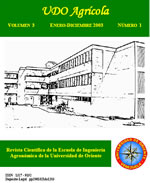
|
Revista Científica UDO Agrícola
Universidad de Oriente Press
ISSN: 1317-9152
Vol. 12, No. 4, 2012, pp. 813-822
|
 Bioline Code: cg12092
Bioline Code: cg12092
Full paper language: English
Document type: Research Article
Document available free of charge
|
|
|
Revista Científica UDO Agrícola, Vol. 12, No. 4, 2012, pp. 813-822
| en |
Impact of olives storage and irrigation with treated wastewater on the oil quality: simulation of mill conditions
GHARSALLAOUI, Mariem; BENINCASA, Cinzia; AYADI, Mohamed; PERRI, Enzo; KHLIF, Moncen & GABSI, Slimane
Abstract
The purpose of this research was to assess the impact of irrigation by treated wastewater on the Tunisian olive oil quality. In
this experiment, olives from fields irrigated with treated wastewater were transported to the laboratory and mixed with other
batches of olives, at different proportions, of the same variety and coming from not irrigated olive groves. In order to meet
the work schedule of Tunisian mills, the mixtures of olives obtained were stored in a laboratory at room temperature for 3, 6
and 9 days before being crushed. The results showed that the free fatty acids and the carotene content of the oils do not
depend on the irrigation system, but are dependent on the duration of olive storage before the extraction. On the contrary,
the irrigation system affects the oxidation state of the oils and their fatty acid composition.
Keywords
treated wastewater; irrigation; mill conditions; olive oil quality
|
| |
| es |
Impacto del almacenamiento de aceitunas y el riego con aguas residuales tratadas sobre la calidad del aceite: simulación de las condiciones de almazara
GHARSALLAOUI, Mariem; BENINCASA, Cinzia; AYADI, Mohamed; PERRI, Enzo; KHLIF, Moncen & GABSI, Slimane
Resumen
El propósito de esta investigación fue evaluar el impacto del riego con aguas residuales tratadas sobre la calidad del aceite
de oliva de Túnez. En este experimento, las aceitunas de los campos regados con aguas residuales tratadas se transportaron
al laboratorio y se mezclaron con otros lotes de aceitunas, en diferentes proporciones, de la misma variedad y procedentes
de los olivares no regados. Con el fin de cumplir con el programa de trabajo de los molinos tunecino, las mezclas de
aceitunas obtenidas se almacenaron en un laboratorio a temperatura ambiente durante 3, 6 y 9 días, antes de ser prensadas.
Los resultados mostraron que los ácidos grasos libres y el contenido de caroteno de los aceites no dependen del sistema de
riego, pero dependen de la duración del almacenamiento de oliva antes de la extracción. Por el contrario, el sistema de riego
afecta al estado de oxidación de los aceites y su composición en ácidos grasos.
Palabras-clave
aguas residuales tratadas; riego; condiciones de almazara; calidad del aceite de oliva
|
| |
© Copyright 2012 - Revista Científica UDO Agrícola
Alternative site location: http://www.udoagricola.orgfree.com
|
|
